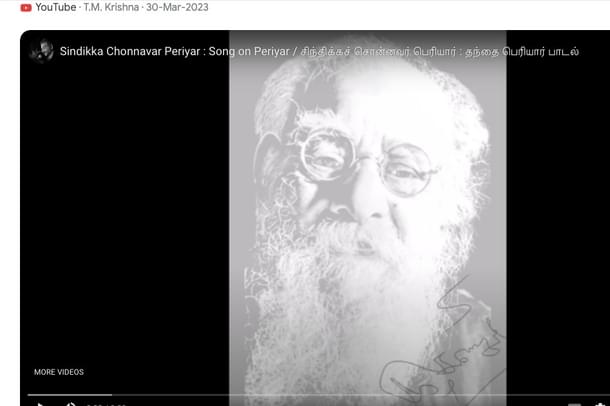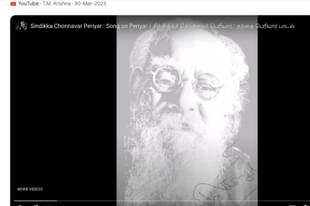Culture
Why T M Krishna's Song On EVR Comes Across As Musically Tame And Intellectually Dishonest
K Balakumar
Apr 01, 2023, 05:35 PM | Updated 05:34 PM IST
Save & read from anywhere!
Bookmark stories for easy access on any device or the Swarajya app.


This is the centenary year of the Vaikom Satyagraha, which was essentially a Gandhian protest to get temple access for the communities derided as lower castes.
But, in Tamil Nadu, where the Dravidian forces are moving forcefully to air-brush history to their convenience and compulsion, the narrative is that it was entirely the brainchild of EV Ramasami (EVR).
It is a trope that has been hammered down for many years, and in recent times, has acquired an insistent clamour.
The fact of the matter is, as gauged from more even-handed accounts from history, EVR did not start the movement and nor did he run the event. He merely participated in it.
The writer Jeyamohan, on his site, writes about how propaganda megaphones in Tamil Nadu are working stridently to blare out their imagined version of a watershed event.
Wading into this cacophony is maverick singer TM Krishna with a song that he terms as an honour to EVR on the occasion of the centenary of the Vaikom Satyagraha.
The song - versified in Tamil and tuned in standard Carnatic music style - has been written by the writer Perumal Murugan and the first few lines of the composition are penned by author Pazha. Athiyaman.
The song itself
Despite the hype from the usual suspects, the song has not elicited much views on YouTube where it has been released.
One listen of the track is good enough to understand why.
The song seems to have got it wrong on all fronts.
It fails the elementary musical test as the lines are pedestrian and prosaic and don't lend themselves to lyrical manifestation when set to tune.
Perumal Murugan is a writer of prose, and it shows in the lines. One line (in English translation) reads: "He was the one who told us to think, Our Elder Periyar, Our Elder Periyar".
Without putting too fine a point on it, you can say middle school annual day functions see a higher level of poetry.
But how did Krishna, who should know how words swim and sound inside a song, go ahead with this?
We know of several instances of music directors not accepting some lines from lyricists on the grounds that they wouldn't render well in the tune of a song. It is not a test of literature. It is a question of musicality.
TMK seems to have failed that test right off the bat.
It may be no coincidence that there is no mention of the name of the accompanying artists in the credit list. (Only RithvikRaja's name is given for sound design).
EVR and Carnatic music
Musically too, the idea of paying tribute to EVR through Carnatic music is misplaced and wholly inappropriate.
Carnatic music is steeped in the tradition and culture of the land. Why would any right-thinking person use its beauty to pay homage to a man who had no respect for those riches?
And from EVR's perspective itself, it might seem an affront to his beliefs to be versified in Carnatic music style.
EVR, in fact, wanted to dismantle the Carnatic music system as he felt that it was - no surprises here - dominated by Brahmins. EVR worked - but did not succeed - in establishing a non-Brahmanical Carnatic music system.
Writing in Kudiarasu (dated: 25/5/1930), he said "I urge our people in the arts not to lose their self-respect for any reason so that we can establish our movement in the field of music as well." The 'our people', of course, is a reference to the non-Brahmins.
Oh! The irony of Bilahari
One can't even cut some slack to Krishna by charitably considering his attempt as an avant-garde effort in line with some of his other endeavours like singing in a moving bus or in places where Carnatic music is not usually heard.
Even if those experiments smacked of 'gimmickiness', you could at least believe that the intention was well-meaning. But here it comes off just as an unseemly performative exercise to wangle some imagined brownie points from the Dravidian sections.
(EVR, in fact, was even more skeptical of those Brahmins who exhibited sympathy to his fevered cause).
Anyway, getting back to the song at hand, it seems an inadvertent irony that it is set to the Carnatic raga Bilahari.
Tamil film fans will remember it as a raga that gets talked about a lot in the movie Unnal Mudiyum Thambi (directed by K Balachander and headlined by Kamal Haasan).
In the film, Kamal's character, a son of a vintage Carnatic musician who goes by the name 'Bilahari' Marthandam Pillai, is consumed by new-age social ideals. In that sense, Krishna has a parallel to that Kamal character.
And when Kamal (Udayamoorthy) has a fallout with his conservative father, he expresses his angst through a song that is set to, well, Bilahari raga. The song, Nee Ondru Thaana En Sangeetham, however, got chopped in the film. Perhaps, Krishna could have done that with his new song.
But it is not our place to say what Krishna should or should not do. However, we can point out that in the film, the clash between the woke son and the old-school dad hits a flash point. And the father pertinently says to his son that the latter should not use the musical acclaim and stage to further his non-musical social beliefs. From what we saw on the screen, Udayamoorthy stops being a platform singer and becomes a full-fledged social activist.
That Udayamoorthy character to this day is remembered for being suffused with intellectual integrity.





